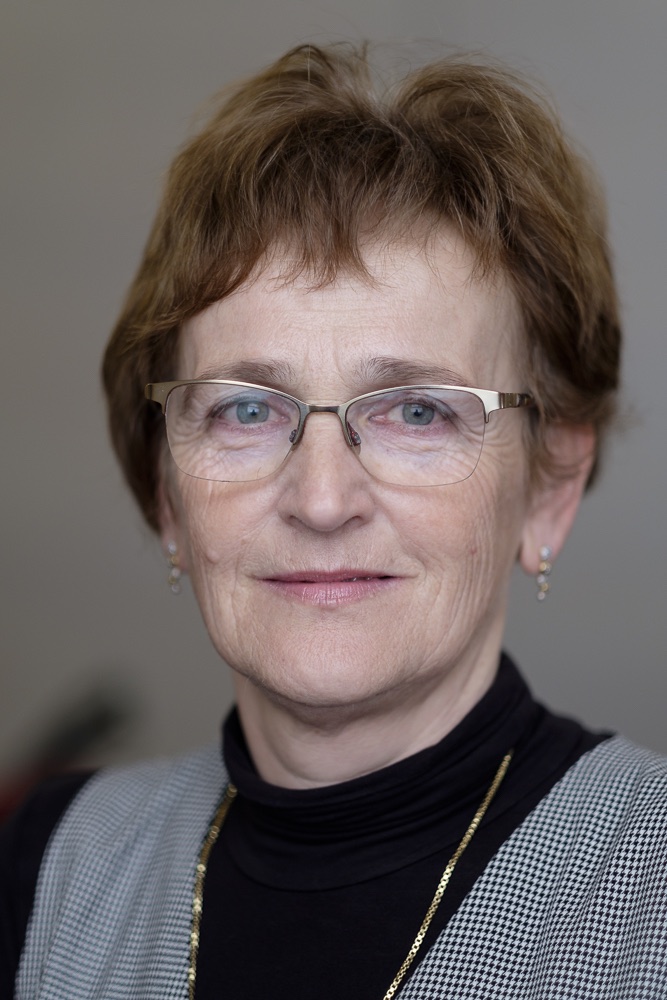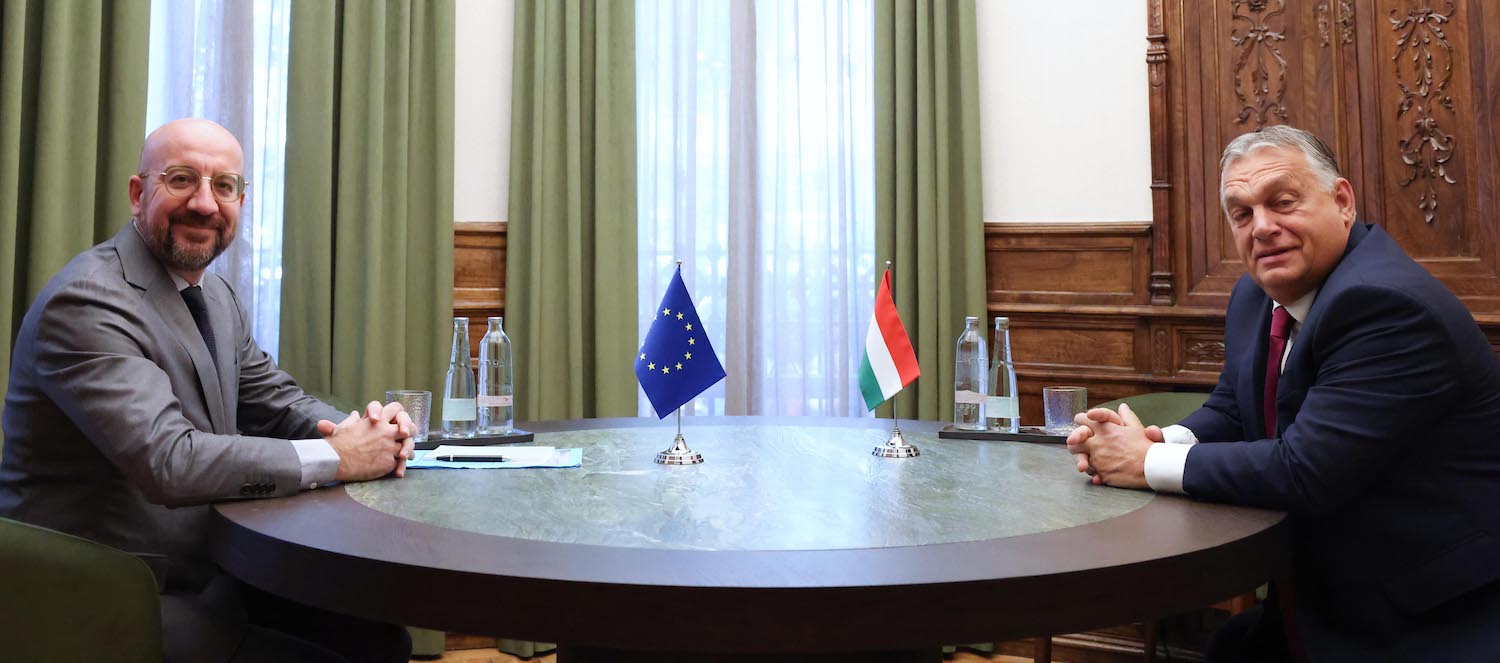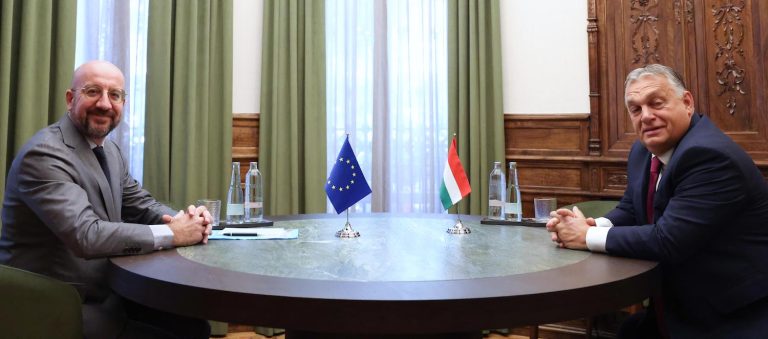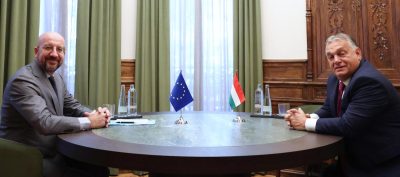Another crucial EU summit is approaching, to be held on February 1, and the European Union is puzzled over how to bring Viktor Orbán on board for a financial aid package for Ukraine—which the Hungarian Prime Minister already vetoed last December. Orbán’s unpredictability created lots of drama at the previous summit, too: he eventually went out of the room to let fellow EU leaders greenlight Kyiv’s EU accession. What to expect from Hungary’s pro-Russian prime minister, who is also and simultaneously trying to unblock billions of euros of EU funds frozen due to his violation of the rule of law? Senior Brussels correspondent Katalin Halmai, one of the best sourced journalists on EU affairs and former president of the International Press Association API-IPA, helps VSquare understand what is going on behind the scenes.
SZABOLCS PANYI: Viktor Orbán was one of the main protagonists at the EU summit in December. Before the meeting, was it possible to guess what Orban really wanted and whether he would allow Ukraine to start the EU accession process?
KATALIN HALMAI: Before the summit, everyone was asking what Orbán wanted but no one knew. The Hungarians kept coming up with new conditions all the time. Hungary is like a matryoshka doll. They ask for something, you comply, then it turns out that they have a next demand. In the case of the European Peace Facility (EPF), Hungary asked for the Hungarian OTP Bank to be taken off of Ukraine’s list of war sponsors. When it was taken off, Hungary didn’t stop rejecting the joint contribution of €500 million to top up the EPF. What do they really want? Nobody seems to know.
Or take a look at the support for Ukraine’s EU accession talks. What has been Orbán’s main problem for a long time? The protection of minority rights of Hungarians in Transcarpathia, a region where ethnic Hungarians are living. The Ukrainians have implemented most of the legislative changes that Hungary and the EU asked for, and now the Orbán government is not talking about minority rights anymore as a precondition. Now they are saying that if Ukraine were to join the EU, they would receive the EU subsidies that the Hungarians are entitled to, and we do not want that. As an EU source told me, the Hungarian position on a number of issues is completely inconsistent. And if you don’t know what Orbán wants, the EU doesn’t know how to get him on board. They may soften Orbán by paying some EU money, but it may not be enough.
Orbán famously walked out of the EU summit in December to let the others decide on Ukraine’s EU accession talks in his absence. Shortly before, the European Commission decided to unfreeze some of Hungary’s blocked EU funds. Were these two things connected?
I think the fact that Hungary was awarded almost half of the frozen EU cohesion funds was not directly linked to the December summit and Orbán’s decision on not blocking Ukraine’s EU membership talks. But the timing of the decision might have been linked to it. How? I will explain. Hungary has delivered the judicial reform that the EU Commission requested. Whether the judiciary in Hungary is independent or not after this reform is another matter. When I asked Commissioner Didier Reynders about it he refrained from expressing his views. He only said that they are monitoring the situation. But the reform that the Commission expected has been implemented by Hungary. However, the Commission could have taken a positive decision on unfreezing the funds later, after the December summit – but instead it did so in a hurry.
After the last legal acts on the judicial reform were officially published in the Hungarian Gazette, within hours the Commission decided on unblocking the funds by written procedure, without convening the college of Commissioners. Many believe that Orbán gave up his veto on starting accession negotiations with Ukraine just because the Commission had decided to unfreeze this money.
What is even more interesting is that not only was the Commission’s decision swift, but the reimbursements and advance payments were also paid out immediately. The Commission usually has sixty days to disburse the money. But this time they didn’t wait long. It might have had something to do with the decisions of the upcoming EU summit on February 1. They wanted to have Orbán’s agreement to the political and financial support package for Ukraine. I heard from several independent sources that Orbán deeply distrusts the EU Commission. He didn’t believe that the money that had been unblocked would actually start to be paid out. So the Commission wanted to convince him that it will. But after receiving the money, the Hungarian government cannot say that it will not contribute to the EU because it does not get an euro cent from them.
Do you think Orbán is also using the blocking of Sweden’s accession to NATO to unfreeze more EU money? Is that related?
I don’t think it’s related to EU funds, but I know that the Swedes are very upset.
Exactly what EU funds are frozen for Hungary and why?
Hungary has a total of €21.7 billion in EU cohesion funding over the current seven years financial cycle, of which €10.2 billion has been unblocked and €11.5 billion is still frozen. This comes directly from the EU budget. Then there is the additional post-pandemic recovery fund of €10.4 billion for Hungary, also frozen. This is made up of grants of €5.8 billion and a cheap-interest loan of €3,9 billion plus €700 million REPowerEU grants. In total, the Commission has unblocked about one third of the total amount frozen.
In order to access the rest of these funds, Hungary would have to meet so-called milestones – but it is doing badly. Hungary has met quite a few of these conditions but there are still many more that it has simply refused to comply with for months. Negotiations on these have completely stalled. For example, there is no progress on elimination of conflicts of interest in the boards of public foundation-run universities – which have led to the suspension of Erasmus and Horizon funding. Other milestones include items such as the extension of the competences of the Integrity Authority [a recently created anti-corruption body] and changing the system of asset declarations of politicians and high level officials. There are also delays in meeting the requirement to upload data to the EU’s risk assessment database ARACHNE. Moreover, there are also delays with long-term plans, such as anti-corruption action plans and programmes.
Has it never occurred to the EU Commission that either the Hungarian media situation or the abusive surveillance might be the reason for the conditionality procedure and freezing EU funds?
Unfortunately no, because the rule of law conditionality procedure, as it is known — which is blocking €6,3 billion in cohesion money — can only be launched if there is a risk that the financial interests of the EU are directly affected by systemic corruption. EU lawyers have not seen evidence that a breach of press freedom could directly jeopardize the proper use of EU funds, although many of us share the view that in a country where there is no full freedom of the press, journalists do not have effective means of uncovering corruption involving EU funds. Moreover, additional funds are being blocked because Hungary does not comply with the EU Charter of Fundamental Rights — concerning migrants’ rights, discrimination against the LGBTQI community, violations of academic freedom — but undermining press freedom is not among them.
When Hungary took the EU Commission to the EU Court of Justice for the rule of law conditionality procedure, the Court confirmed that such proceedings could only be launched for misusing the EU budget. So if, for example, Hungarian taxpayers’ money is being systematically stolen by state actors or oligarchs, the EU cannot interfere with the same process.
There has been this image of Viktor Orbán: that he is much more moderate behind closed doors in Brussels compared to the way he communicates about the EU for the Hungarian audience. Was this really the case in previous times and is it still the case since the EU summit in December?
Orbán has generally been described so far as being constructive and less combative at European Council meetings. Behind closed doors he is showing his friendlier face. I hear that he often expresses radically different opinions inside the room than outside or, for example, in his social media posts. A few months ago, he arrived at an EU summit and posted a video on his Facebook page asking ‘where the EU put the money’. That’s when the debate on the EU budget review began, with the EU Commission requesting extra contributions from member states. After the summit, I had the opportunity to ask the President of the Commission whether Prime Minister Orbán had asked her where the money had gone. After all, they spent a day and a half in the same room. Ursula von der Leyen’s answer was ‘no’. This is a good example of how Viktor Orbán plays only to the domestic audience.

Katalin Halmai
Didn’t Orbán cross a red line by vetoing the financial aid to Ukraine?
It was said about him so many times that he crossed a red line – and then it always turned out that the EU would eventually find some peaceful solution to the ‘Orbán problem’. And what if he has crossed the line? What tools is the EU willing to use to make him aware of this? The EU institutions are usually pointing fingers at each other. The European Commission always takes a rather legalistic position and does not like to engage in political debates. The arena for political debate is the European Parliament (EP) and the European Council, or the EU Council of Ministers. The EP often debates the Hungarian situation, but in most cases their decisions are not binding. The Council refuses to do the same except for the Article 7 procedure which has been stalled for more than 5 years now. The European Council put the ‘Orbán problem’ on its agenda only once when Hungary passed its homophobic ‘child protection law’.
I once asked Charles Michel, the President of the European Council, when the 27 leaders would like to deal with the “Orbán issue”. I pointed out to the fact that his “illiberalism” is infecting the EU. Look at Greece, Italy, and others. Michel replied that he had to work for EU unity, and Orbán, when it comes to important issues, is always on board. No one should think for a moment, he said, that only Hungary poses problems. He ended by saying that Orbán eventually helps him to build the necessary consensus and he makes interesting contributions at Council meetings, “we always listen to what he says.” This is a typical argument when you ask diplomats or officials about Orbán. That he agreed to all sanctions packages against Russia, the last one at the summit in December. That when it was necessary, Hungary was always on board, it didn’t balk. And it is the unity that matters.
What was the situation with the Article 7 procedure against Hungary until recently, when the European Parliament came up with its own initiative?
The Article 7 procedure has been stalled in the Council of Ministers since September 2018. There are stages in this process with exchanges of views and hearings every six months. It has not gone beyond that. The next step would be for member states to make recommendations for Hungary. Not only are they not thinking about sanctions, which could be, for example, the suspension of Hungary’s voting rights – which many in the EP think would solve the EU’s problem with the Orbán veto – but there is so much resistance that they do not even want to advance to this recommendation stage.
This is not just because one country or another supports Hungary. Many member states of Central and Eastern Europe would find it difficult to vote in favor of the Article 7 when it comes to imposing such heavy sanctions on Hungary. I am convinced that Croatia, Bulgaria and Romania would also oppose it, along with Slovakia, of course. Perhaps not the Czech Republic or Poland… Italy’s Giorgia Meloni would also think twice before giving her support to such a decision on sanctions. So the European Council does not want to have a political debate on Hungary either. Many leaders are like: what if it’s about us in the next turn? And they prefer to refrain from expressing their views.
The European Parliament has recently come up with its own Article 7 initiative to strip Hungary of its voting rights. What do you expect to happen next?
I don’t expect the member states to give in to the EP’s request this year and conclude that EU values are being seriously and persistently violated in Hungary, and then sanction the Orbán government. The foreign minister of Belgium, which currently holds the rotating EU Presidency, also told during the debate in the European Parliament that a hearing on the situation in Hungary would be held in June under the Article 7 procedure. This is business as usual. Then, after the Begians, Hungary will hold the rotating presidency. Who is it that will take the initiative of withdrawing the voting rights from the President of the EU Council? But we have to see how the EP elections play out and if the new Parliament will continue to exert pressure on the member states.
Will the recent Polish and Slovak elections and their new governments bring a change in the way the EU’s decision-making works?
Robert Fico has so far fallen in line, not trying any maverick moves. And the EU institutions are very happy about Poland and that they may no longer have to deal with the rule of law issue. A lot of money is blocked for Poland too and the Poles seem to have difficulty in making required changes [because of President Andrzej Duda and other holdovers of the former Law and Justice government] that would give them access to that money. So there is some serious thinking going on in Brussels about how this could be done, and how to help Donald Tusk’s democratic government without spitting in the face of the rule of law. The main decision maker on Polish issues is President of the Commission Ursula von der Leyen, and a lot depends on her. Poland, together with Hungary, has also already received a substantial advance from the REPowerEU fund aimed at reducing dependency on Russian fossil fuels.
Viktor Orbán’s ambition is for his MEPs to join the European Conservatives and Reformists Group (ECR) in the EP after the elections. Meanwhile, there have been reports that the European People’s Party (EPP) and ECR may enter closer cooperation, and the latter could become part of the leadership of the European institutions. How would this work out for Orbán in your opinion?
The overwhelming majority in the EPP does not want to see Orbán in their ranks. I think it is quite impossible at the moment for him to approach the EPP, even through a possible ECR membership, but we will have to wait for the EP elections. What is certain is that in the EPP, they do not rule out joining forces with certain parties of the ECR – but especially with those who do not want Orbán’s Fidesz party among them. In the EPP, Donald Tusk and his PO party’s MEPs would be vehemently opposed to either Fidesz or Poland’s Law and Justice party (sitting in the ECR group) coming closer to them. And the vast majority of the EPP has a similar view on this. Manfred Weber, who now chairs both the EPP parliamentary group and the party family, would also heavily object to seeing Orbán getting closer to the party family, and Weber has considerable influence.
After such a contentious period, what do you think the Hungarian EU Presidency will look like [Hungary takes over the rotating presidency of the Council of the EU in the second half of 2024]?
Again, the question is what kind of presidency Viktor Orbán wants. Hungary can absolutely make a well-prepared and professional presidency with minimal politics and controversy. And Hungary can have a very confrontational, nasty, bickering presidency as well. I think the first one is more likely, but we will see, it depends on many things. Mostly on how the EP elections turn out. If the so-called new right parties get stronger, we might have a more aggressive, confrontational Hungarian presidency.
Meanwhile, there is talk of taking certain rule of law dossiers away from the Hungarians during their EU Presidency. This is mainly about the Article 7 procedure. If the majority of member states decide they want to continue with the procedure but do not want to leave it to the Hungarian presidency, the current Belgian presidency may take over the dossier.
When I asked the Belgian ambassador to the EU in a public press briefing, he admitted that this is possible, that there are examples of this happening. If there is a conflict of interest, a member state can take over the management of a certain topic on a temporary basis, and that is under consideration. But no decision has been made yet, we still have six months to think about it, the ambassador said.
The Belgian EU presidency is in a frantic race against time. They want to close as many dossiers as possible so that the Hungarians don’t have too many left, because everybody is concerned the Hungarian presidency can be problematic. In practice, the last sitting of the European Parliament is in April, and they have to get everything done by then.
Finally, what do you expect from the extraordinary EU summit on February 1? Will Orbán veto the Ukraine Peace Facility again?
The plan was to try to get Orbán to accept a possibly slightly modified version of the agreement approved by the 26 member states at the EU summit last December. In the meantime, discussions have started on how to get Hungary on board. For now, the Hungarian government wants more than what member states are willing to give, but negotiations are ongoing. In Brussels, there is still a belief that the 27 countries can reach an agreement on the Ukraine aid package. But the question still hangs in the air: what does Viktor Orban want? What if he makes new demands? The Hungarian prime minister’s predictable unpredictability makes such planning difficult.
Cover photo: Informal meeting of Charles Michel and Viktor Orbán in Spain, Granada, 5.10.2023. Source:Pignatelli/EUC / Zuma Press / Forum
VSquare’s Budapest-based lead investigative editor in charge of Central European investigations, Szabolcs Panyi is also a Hungarian investigative journalist at Direkt36. He covers national security, foreign policy, and Russian and Chinese influence. He was a European Press Prize finalist in 2018 and 2021.







